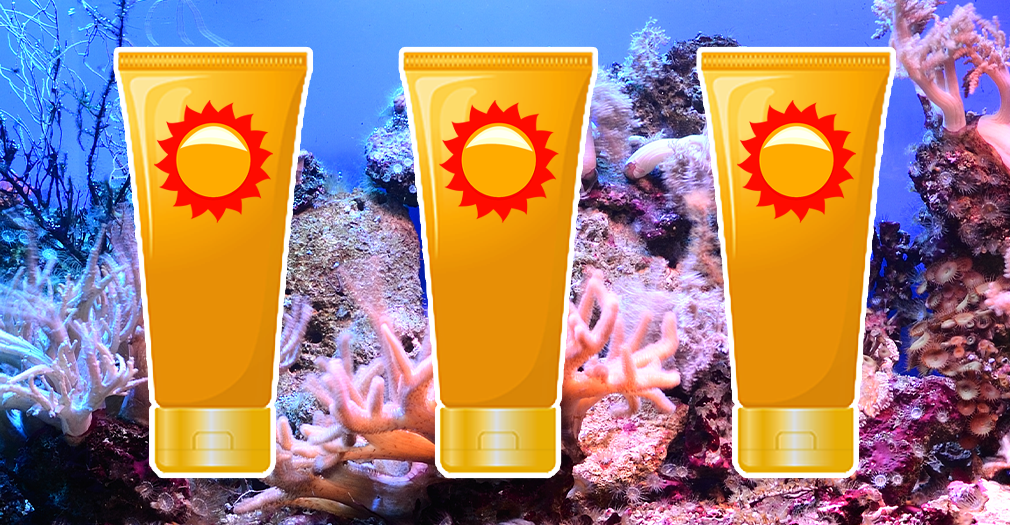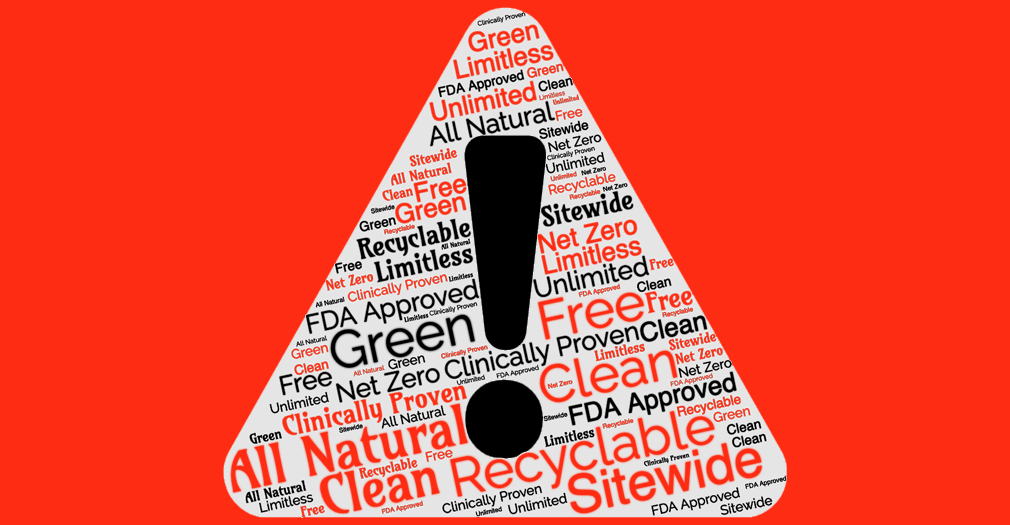A majority of U.S. consumers prefer environmentally friendly products, and are even willing to pay more for them. But when ads make something sound better for the environment than it actually is, that’s called greenwashing.
TINA.org has tracked more than 150 class-action lawsuits accusing marketers of making misleading environmental claims. A breakdown of everything from the green claims and products at issue, to when and where the complaints were filed, to the status of the cases as of March 2025, follows.
Environmental claims at issue
A majority of the class-action lawsuits have alleged that marketers make deceptive environmental claims using words and phrases, such as environmentally friendly, recyclable and sustainable. Other lawsuits have alleged that marketers misleadingly imply products are “green” using eco-friendly imagery.
Of the greenwashing class-action lawsuits:
- At least 21 percent have alleged false and/or misleading environmentally friendly, earth friendly, eco-friendly or environmentally responsible claims.
- 23 percent have alleged false and/or misleading sustainable claims.
- 14 percent have alleged false and/or misleading recyclable claims.
- 9 percent have alleged false and/or misleadingly compostable or biodegradable claims.
- 6 percent have alleged false and/or misleading carbon reduction claims.
Products and companies
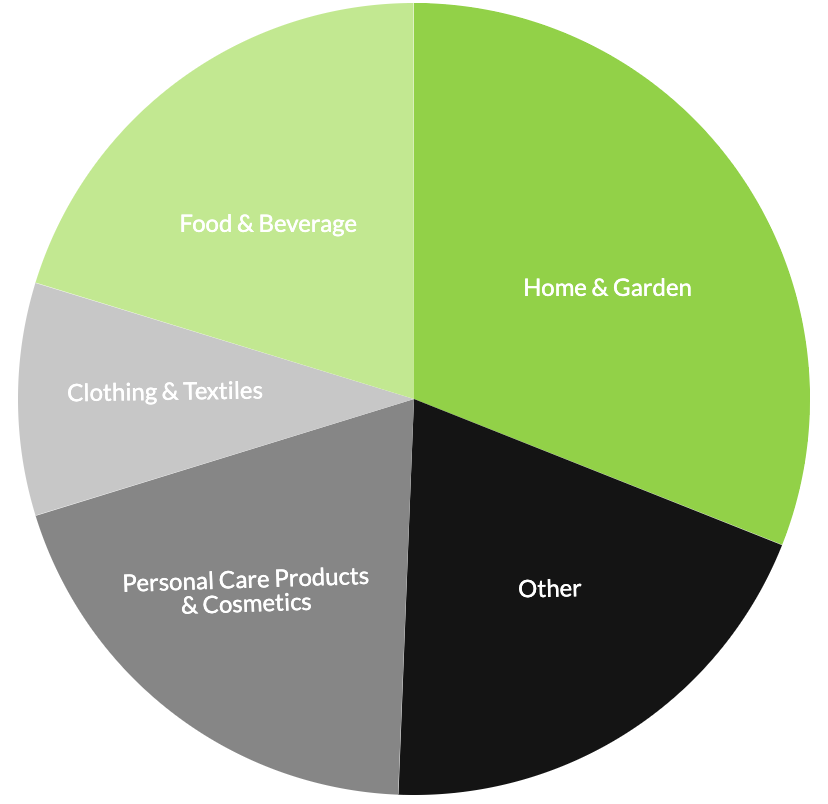
31 percent of the greenwashing lawsuits cite false and/or misleading environmental claims for home and garden products. Items range from dishes and cookware, to household cleaners and laundry detergents, to trash bags, paints and even charcoal briquettes. For example, lawsuits have alleged that:
- Hefty and Glad recycling bags are not made of recyclable materials.
- Disposable dishes from Chinet, Amazon and others marketed as compostable do not break down into usable compost.
- Gain and Arm & Hammer laundry detergents represent that they are environmentally friendly using green containers and images of nature when the products contain an ingredient harmful to the environment.
- Poland Spring, Dasani and other bottled waters are marketed as “100% Recyclable” when certain parts of the bottles – including the cap and label – are not recyclable.
- Igloo coolers are marketed as biodegradable and made with recycled materials when they do not fully degrade in a reasonable period of time and significant parts are not made of recycled materials.
20 percent of the greenwashing complaints relate to food and beverages. There are lawsuits alleging that:
- Fast food restaurants – including McDonald’s and Burger King – market burgers and other menu items as sustainable when they come in packaging that contains per- and polyfluoroalkyl substances, or PFAS, which are harmful to the environment.
- Keurig Green Mountain advertises coffee pods as recyclable when they end up in landfills.
- StarKist, Chicken of the Sea, Bumble Bee and others market tuna products as dolphin safe when the tuna is caught using fishing methods that seriously injure and kill dolphins, in addition to other marine life.
- Evian advertises its bottled water as “carbon neutral” when carbon dioxide is released into the atmosphere during manufacturing.
- Hershey’s, Nestlé, Mondelez and others market that they source cocoa using sustainable practices when their practices harm the environment.
20 percent of the class actions concern personal care products and cosmetics. For example, lawsuits have alleged that:
- Products bearing the “Target Clean” label contain ingredients that harm the environment.
- Colgate and Tom’s of Maine toothpaste tubes marketed as “recyclable” are not recycled at a majority of facilities in the United States.
- Banana Boat, Hawaiian Tropic and other sunscreens marketed as reef friendly contain ingredients that harm coral reefs and marine life.
- Band Aid bandages marketed as sustainable and environmentally friendly contain harmful PFAS.
- Neutrogena and Aveeno makeup removing wipes marketed as plant based contain synthetic, non-plant based ingredients.
- Charmin advertises that the toilet paper brand protects, grows and restores trees when it uses harmful logging practices and replaces cut trees with trees that are valuable for logging.
9 percent of the lawsuits relate to clothing and textiles. These complaints have alleged that:
- Nike, Lululemon, H&M, Canada Goose, Gucci and REI falsely market clothing as sustainable.
- Walmart and Kohl’s falsely advertise products as environmentally friendly because they are made of bamboo when they are actually made of rayon, the manufacturing of which emits hazardous pollutants into the air.
- Allbirds’ misleadingly claims that its running shoes have a “Low Carbon Footprint.”
- H&M falsely markets clothing as made with recycled and/or organic materials when they are made with synthetic and non-organic materials.
Greenwashing lawsuits have also alleged that automakers falsely market “clean diesel” vehicles as environmentally friendly, the makers of dog poop bags falsely advertise their products as compostable, and airlines falsely market that their purported carbon offset programs reduce the environmental impact of flying.
Other notable lawsuits have alleged that:
- Apple falsely markets watches as “carbon neutral” when its offset projects do not reduce carbon emissions, and that it false advertises watch bands as designed for environmental sustainability when they contain toxic PFAS.
- Amazon misleadingly markets that paper products are sustainable and the company mitigates carbon emissions when paper products are manufactured using the logging and bleaching processes that harm the environment and the company’s suppliers release carbon dioxide into the environment.
- Etsy falsely claims that it completely offsets the carbon emissions from shipping.
Location of courts

Greenwashing class-action lawsuits have been filed in 18 states. Nearly half of the complaints — 70 — were filed in California. The remaining lawsuits were filed in Florida, Georgia, Illinois, Louisiana, Maryland, Massachusetts, Michigan, Minnesota, Missouri, Montana, New Jersey, New Mexico, New York, Pennsylvania, Texas, Washington and Wisconsin.
Original filing date
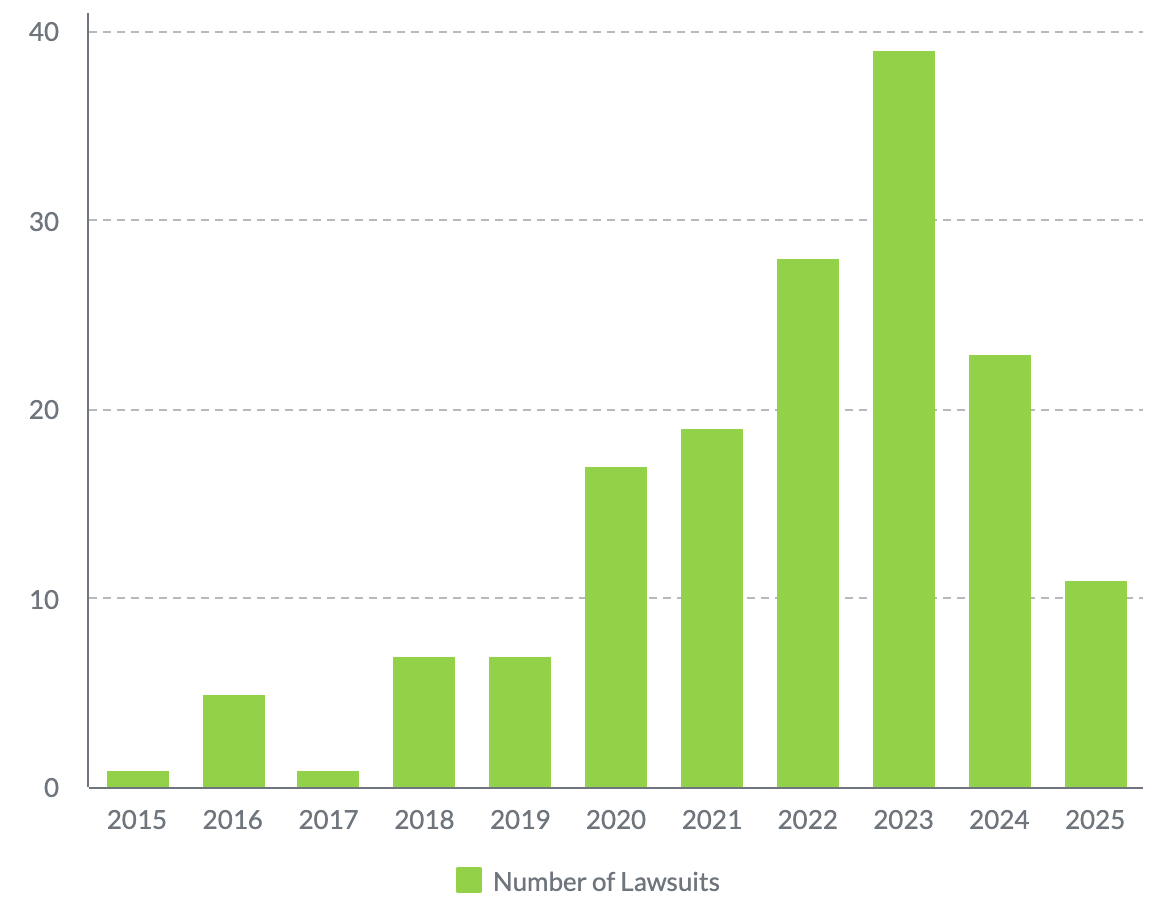
Since TINA.org began tracking greenwashing class-action lawsuits, in 2015, the number of complaints has steadily risen. The number of lawsuits more than doubled, from 7 to 17, in 2020. Since 2020, more than a dozen lawsuits have been filed each year. The largest increase so far came in 2023, when the number of lawsuits increased by 11.
Status of cases
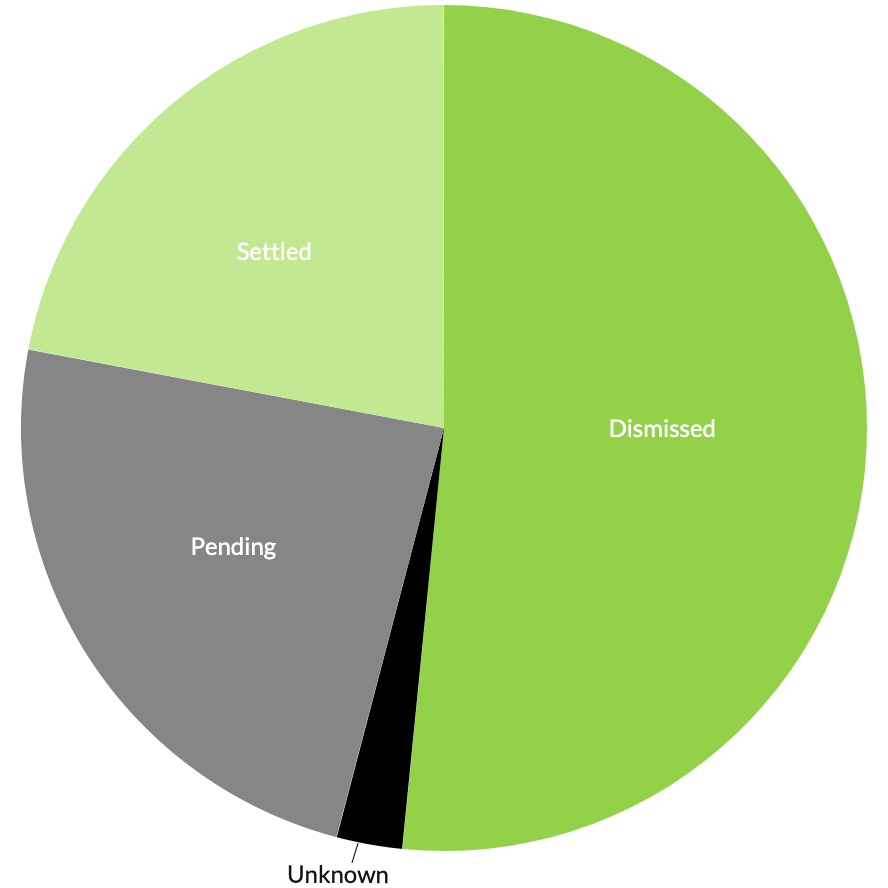
74 percent of the greenwashing class-action lawsuits have been settled and/or dismissed. Appeals were filed regarding the approval of one settlement agreement and the dismissal of two lawsuits. Claims remain pending in 26 percent of the lawsuits.
Of the 35 cases that settled, the terms of settlement agreements were disclosed in 15 cases. Class members were awarded monetary relief in 14 of those cases and the company agreed to make changes to marketing materials in 11 of those cases.
Federal courts dismissed:
- 2 cases regarding recyclable claims by bottled waters brands (Haggerty and Duchimaza).
- 4 cases regarding environmental claims made by clothing and apparel companies (Allbirds, H&M, Lululemon and Nike).
- 1 case regarding environmental claims promoting blankets.
- 5 cases regarding carbon neutral claims and carbon offset programs (2 Royal Dutch Airlines cases, Etsy, Evian, and United Airlines).
- 1 case regarding reef-friendly claims for sunscreens.
- 1 case regarding environmental claims for hair products.
- 1 case regarding environmental claims made by a grocery store.
- 2 cases regarding environmental claims made regarding securities (Verizon and Lumen).
- 1 case regarding “Clean Diesel” claims.
What’s the takeaway?
As TINA.org wrote in a September 2023 complaint to the FTC regarding deceptive “recyclable” claims for Tom’s of Maine and Colgate toothpaste tubes, “consumers are generally at the mercy of brands’ representations when seeking environmentally friendly products.”
But these class actions show that consumers are fighting back. So when companies green it, they better mean it.
Find more of our coverage on greenwashing here.






